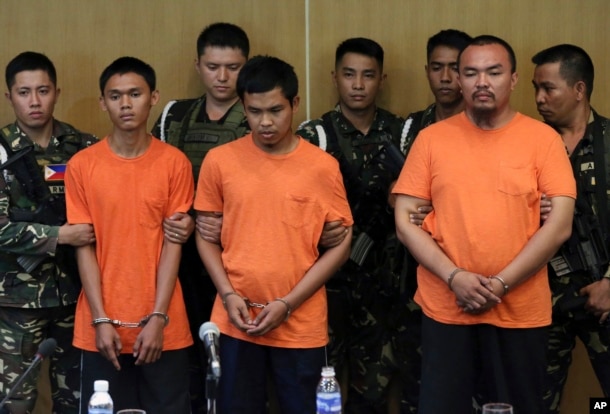As the Islamic State terror group faces territorial losses in the Middle East, there are signs that the group is increasing its cooperation with local militant groups in Southeast Asia.
A new report from researchers at the Institute for Policy Analysis of Conflict (IPAC), warns that supporters of the terrorist group are networking in Southeast Asia and law enforcement agencies appear unprepared for the new threat.
“Over the last two years, ISIS has provided a new basis for cooperation among extremists in the region,” said IPAC director Sidney Jones, using an acronym to describe the Islamic State, which is also known as IS, ISIL, and Daesh.

Suspected Muslim extremists, from left in front row, Wendel Apostol Facturan, Musali Mustapha and TJ Tagdaya Macabalang are presented to reporters at Camp Aguinaldo military headquarters in Quezon city, north of Manila, Philippines, Oct. 7, 2016.
Four extremist groups are increasingly focusing on the southern Philippines’ Mindanao region, with fighters, instructors or funding at times from Indonesia or Malaysia. In turn, the groups have provided refuge, training sites, combat experience or arms.
“That cooperation could take on new importance as ISIS losses in the Middle East increase the incentive to undertake violence elsewhere,” Jones said.
Philippines President Rodrigo Duterte, since taking office in June, launched negotiations to end long-running violence in the southern Philippines, offering “multiple options” to groups in terms of proposals to end the violence.
Ehud Ya’ari, an Israel-based military analyst and political commentator, sees a growing threat for Southeast Asia as military defeats for ISIS in the Middle East lead to hundreds of fighters returning to Asia.
“Once ISIS is defeated in the Levant ... some of them, many of them, I don’t know, are coming to the islands,” Ya’ari said at a regional security seminar at Bangkok’s Chulalongkorn University.
“They see the islands of Indonesia, Philippines, etcetera, as a promising new base and they dedicate a growing amount of investment in the literature and propaganda to this region,” he added.
Elina Noor, director of the Malaysia-based Institute of Strategic and International Studies, said the southern Philippines will be a “regional hub” for the extremist operations.
But the IPAC report said while ISIS-driven unity among the groups may be only temporary, “it could leave behind a hard core of Mindanao-based jihadists who are more ideological than their predecessors and look to like-minded associates in the region for support.”
'No Single Profile' for IS supporters
Analysts, including Noor, see a threat from the numbers of people from Asia traveling to the Middle East to join the Islamic State.
Malaysian authorities have reported a rising trend in terrorism-related arrests since 2013, citing some “80-plus” arrests in Malaysia in 2015, and 90 detentions as of August 2016.
Noor says the crackdown points to a broad profile of those supporting militant groups. “There is no single profile," she said. "They come from different age groups, they come from different professional and non-professional backgrounds.”
Arrests included an Islamic religious teacher, senior government officials, military and security forces personnel, as well as teens and children as young as 14, including girls.
A primary reason many travel to the Middle East is a motivation to "redress injustices in Syria and Iraq,” as well as in other countries. But, she added, there is a rising tone of a more conservative view of Islam in Southeast Asia among the groups.
“What many are now seeking is a puritanical brand of Islam. So that’s the ambition," she said. "And who are Southeast Asian [militants] turning to for that direction — West Asia, the Middle East.”
To tackle the issue of extremism, Noor says governments need to counter an ideology "rooted in political grievances, not religious ones, often rooted in a failure of good governance."
She also calls for the “de-politicization” of religion in which governments need to step back from "manipulating religion for political purposes."
Riad Kahwaji, head of the United Arab Emirates’-based Institute for Near East and Gulf Military Analysis, warns against the “import” of the sectarian divisions within Islam that have deeply divided communities in the Middle East, at a terrible cost to human life.
“The states here [in Southeast Asia] should work hard to prevent any division between the Islamic sects — the Sunnis and the Shias," Kahwaji said. "They should work much harder to prevent any spill over from the troubles in the Middle East into Southeast Asian countries.”
Analysts say the internet and social media have led to self-radicalization among some individuals capable of carrying out so-called lone wolf attacks. Australia’s has faced a spate of such attacks and threats, with the national terrorism threat currently set at “probable.”
More than 100 Australian nationals are reportedly fighting alongside or supporting the Islamic State in Iraq and Syria.
Colin Rubenstein, executive director of the Australia-Israel and Jewish Affairs Council, says the concerns for Southeast Asian countries will come after military action against Islamic State in Syria and Iraq concludes.
“There’s no suggestion they will disappear [after the fighting ends]. As we’ve seen, it will globalize and in terms of [militants] coming back to their [home] countries; obviously that process unfortunately can include Australia,” Rubenstein said. “So eternal vigilance and staying ahead of the curve — that’s what the authorities are well aware they need to do.”
http://www.voanews.com/a/facing-pressure-at-home-islamic-state-focuses-on-southeast-asia-/3569896.html

No comments:
Post a Comment
Note: Only a member of this blog may post a comment.